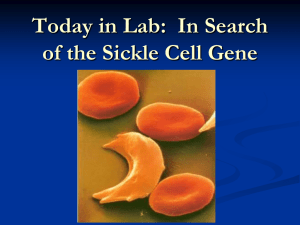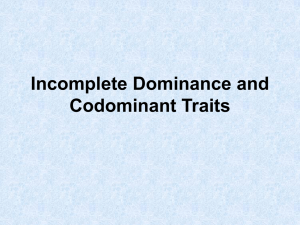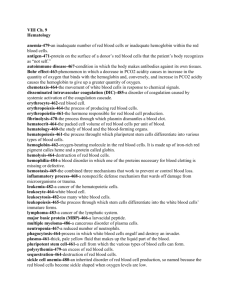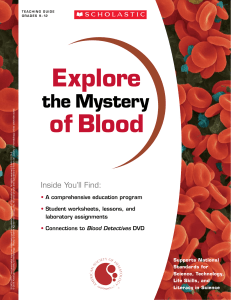MLAB 2360 Clinical I Serology/Hematology Activity
advertisement
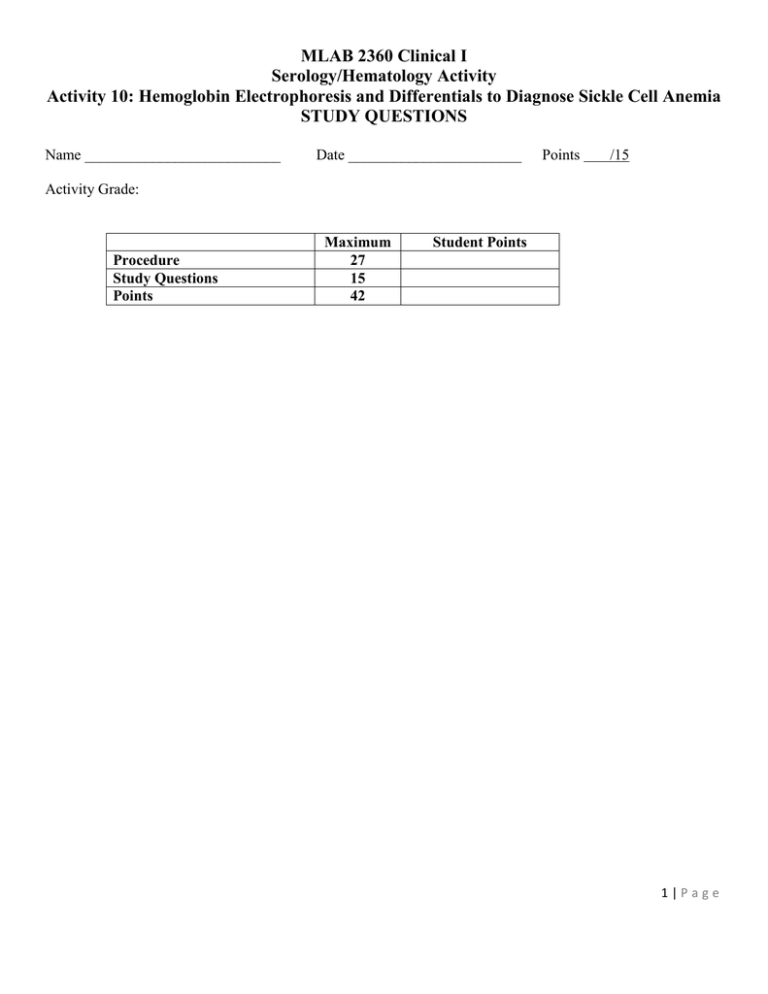
MLAB 2360 Clinical I Serology/Hematology Activity Activity 10: Hemoglobin Electrophoresis and Differentials to Diagnose Sickle Cell Anemia STUDY QUESTIONS Name __________________________ Date _______________________ Points /15 Activity Grade: Procedure Study Questions Points Maximum 27 15 42 Student Points 1|Page MLAB 2360 Clinical I Serology/Hematology Activity Activity 10: Electrophoresis and Differentials to Diagnose Sickle Cell Anemia LABORATORY WORKSHEET Name __________________________Date _______________________ Points /27 The Adida family has immigrated to the United States from Nigeria. The child visited the doctor and was found to be extremely anemic. Additional tests have been requested including a CBC and hemoglobin electrophoresis. Patient information: 1. Mother: Sarah Adida, ID # 145679, date of birth 11-21-1988 2. Father: Franklin Adida, ID # 267348, date of birth 7-19-1986 3. Child: Joseph Adida, ID # 346128, date of birth 9-07-2007 Instructions You have been given the automated CBC results for all patients. You are to perform the following tasks: 1. Set up patient samples for hemoglobin electrophoresis. There will be 3 patient samples and 3 controls: a. Sickle cell DNA control – homozygous (S/S) b. Sickle cell DNA control – heterozygous (A/S) c. Normal DNA control (A/A) 2. While the gels are being electrophoresed you will perform differentials and evaluation of red blood cell morphology on the three patients. a. Normal differential should take 15 minutes b. Abnormal differential should take 30 minutes 3. Compare electrophoresis results of patients with the controls and interpret the findings. Record the results below. 4. In the box below draw a picture of the results obtained from the gel LABELING EACH LANE. 5. IMPORTANT: Report results in the table at the bottom as follows: (1 point each, 9 total) a. Homozygous S report out as “SS,” b. Heterozygous S report out as “AS” c. Normal report out as “AA” Recording Control and Patient Results – Record Bands Observed for Each Sample Ctrl S homo DATE Ctrl S hetero Ctrl Normal Name ID # PATIENT NAME PATIENT ID # RESULTS Initials Time CONTROLS Sickle cell hemoglobin control – homozygous Sickle cell hemoglobin control - heterozygous Normal hemoglobin control Results Grade: Date, initials, time 1 point each (3 total). Name, number, results 1 point each (12 total). Patient and control results recorded in correct format 0.5 point each (3 points). (18 Total) 2|Page MLAB 2360 Clinical I Serology/Hematology Activity Activity 10: Hemoglobin Electrophoresis and Differentials to Diagnose Sickle Cell Anemia STUDY QUESTIONS Name __________________________ Date _______________________ Points /15 1. Based on the information provided is Sickle Cell disease a dominant or recessive trait? (1 point) 2. State the genotypes of the potential offspring for a couple with the following genotypes (2 points): Mother: A/A Father: S/S Children: 3. State the amino acid substitution which causes the formation of hemoglobin S. (1 point) 4. State the disease for which individuals that are heterozygous for Hemoglobin S are resistant to. (1 point) 5. State the single base mutation for hemoglobin S. (1 point) 6. Describe the nucleotide sequence of normal b globin gene and the point mutation which occurs in codon 6. (2 points) 7. State the palindrome recognition site for the restriction enzyme Mst II. (1 point) 8. State the genotype of each patient (A/A, A/S or S/S) ( 3 points): a. Mother b. Father c. Child 9. State the phenotype of each patient ( Normal, Carrier or Sickle Cell) (3 points): a. Mother b. Father c. Child 3|Page
